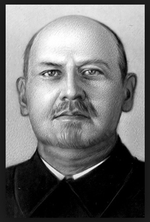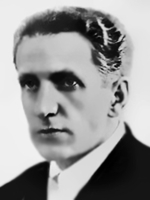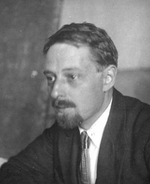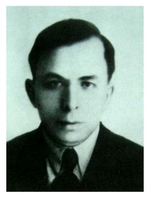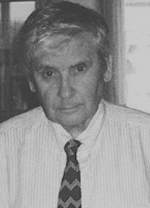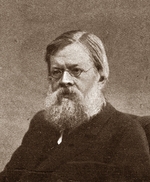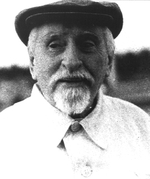Articles
Priselkov Mikhail (1881–1941)
Priselkov Mikhail (1881–1941) – historian, member of the Imperial Orthodox Palestinian Society.
He was a disciple of S. F. Platonov and A. A. Shakhmatov. In 1903, he graduated from St. Petersburg University and stayed at the Chair of the History of Russian Church to prepare for the Professor position. In 1907, he became Ass. Docent at the University, and started to teach at the First Imperial Cadets School. In 1914, he defended his Master thesis ‘Essays of the Ecclesiastic and Political History of Kievan Rus’ of the Tenth – Twelfth Centuries’. Since 1918, he was Professor of the St. Petersburg University. In 1920, he became Dean of the Faculty of Social Studies.
Read More
Prokofiev Georgy (1897‒1942)
Prokofiev Georgy (1897‒1942) – linguist, ethnographer, teacher.
In 1916, he enrolled the Physical and Mathematical Faculty of the Petrograd University. In 1919, he transferred to the Ethnographical Department of the Geographical Institute, which was transformed into the Geographical Faculty of the Leningrad State University. He graduated from the University in 1925; his supervisors were L. Ya. Sternberg and V. G. Bogoraz.
In 1921, from the Northern Trade Expedition, he was sent for studying Nenets.
In 1925-1928, he was Head of the school for Ostyak-Samoyeds at the trading station of Yanov Stan; in 1928-1930, on the order of the Committee of the North, he became Head of the local base at the Samoyedic station of Khoseda-Khard.
Read More
Propp Vladimir (1895‒1970)
Propp Vladimir (1895‒1970) – folklorist.
In 1914, after the Annenschule (school at the Lutheran Church of St Anne in St. Petersburg), he enrolled to the Historical and Philological Faculty of the Petrograd University, where he studied Russian and German Philology. He graduated from the university in 1918; during the WWI, on his own will, he passed through medical courses and worked as a sanitary at a military hospital in Petrograd.
In 1921, he started to study at the Petrograd Theological Institute, but soon left it. In 1918-1928, he worked as a teacher of Russian language and literature at the Third Teal school (it was transformed into 102 Joint Labour school), supervised pupils of the senior level.
Read More
Prugavin Aleksander (1850–1920)
Prugavin Aleksander (1850–1920) – specialist in the history of Old Believers and Russian Sectarianism, ethnographer, journalist, revolutionary Narodnik.
He was born in Arkhangelsk; in 1869, he enrolled to the Moscow Petrovskaya Agrarian and Forest Academy. In 1871, he was arrested in the frames of the ‘Nechaev Affair’ and sent to exile to the Arkhangelsk Region, to Kem’, where he me Old Believers of various groups and started to study that religious phenomenon. In 1879, the period of the police surveillance finished, and P. was able to return to St. Petersburg. He published articles in numerous media: ‘Golos’, ‘Nedelya’, ‘Novoe Vremya’, ‘Russkie vedomosti’, ‘Russkyi kurier’, ‘Strana’, ‘Russkaya mysl’, ‘Vestnik Evropy, ‘Istoricheskyi vestnik’.
Read More
Pulner Isaih (1900–1942)
Pulner Isaih (1900–1942) – ethnographer.
In 1923-1925 – student of the Institute of Hebrew History and Literature in Petrograd/Leningrad. In 1924-1925, he was also Secretary of the Managing Office of the Institute.
In 1929, he graduated from the Geographical Faculty of the Leningrad State University with the specialization in the Caucasus studies (at the Ethnographical Department); his supervisors were V. G. Bogoraz, E. G. Kagarov, L. Ya. Sternberg).
In 1924, he participated in the expedition studying Ashkenazi Jews – under the supervision of L. Ya. Sternberg and V. G. Bogoraz.
Read More
Putilov Boris (1919—1997)
Putilov Boris (1919—1997) – ethnographer and folklorist.
In 1936, after finishing school in Grozny, he entered the Leningrad Teachers-Training Institute named after A.I. Herzen; his supervisor was N.P. Andreev. After the graduation of the institute, he was sent to work in the town of Sortavala, then in Tikhvin. In 1942, he returned to Grozny.
His Candidate thesis was ‘The Historical Songs of the Sixteenth – Nineteenth Centuries at Terek’ (1948, Institute of Russian Literature of the Ac. of Sc. of the U.S.S.R. (Pushkinsky Dom), research consultant А.М. Astakhova. His Doctor thesis was ‘Russian Historical Musical Folklore of the Thirteenth – Sixteenth Centuries’ (1960, Leningrad State University).
Read More
Putintsev Fedor (1899–1947)
Putintsev Fedor (1899–1947) – propagandist, researcher of Sectarianism.
In 1920, he became a member of the Communist Party (Bolshevik); an active participant of anti-religious movement. Since 1925, he was a member of the Central union of the League of the Militant Atheists of the U.S.S.R., a representative of its left wing. In 1932-1934, he edited the ‘Bezbozhnik’ Newspaper. He studied the history of ideology and political role of religious Sectarianism.
In 1928, he participated in discussions at the Communist Academy in Moscow on religious matters. He criticized ‘little bourgeois’ and Narodniks in their approach to religious minorities (first of all V. D. Bonch-Bruevich and A. T. Lunacharsky). In 1926-1928, he wrote several surveys on Sectarianism.
Read More
Pypin Aleksander (1833–1904)
Pypin Aleksander (1833–1904) – historian of literature, ethnographer, folklorist.
In 1853, he graduated from the Historical Faculty of the St. Petersburg University. In 1857, he defended his thesis ‘An Essay on the Literary History of Old Russian Novelettes and Tales’ and got his Master degree in Russian Literature. In 1860, he became Professor of the Chair of the Wold History at the Historical and Philological Faculty of the St. Petersburg University. In 1861, he left the University together with some other professors, supporting students’ protests against changes of the University Rule by Minister E. V. Putiatin. Since 1863, he was a member of the Editorial Board of the magazine ‘Sovremennik’; in 1865-1866, he was Editor of tthat magazine together with N. A. Nekrasov.
Read More
Radlov Vasily (1837–1918)
Radlov Vasily (1837–1918) – specialist in Turkic studies, ethnographer, archeologist, specialist in museum work.
In 1854-1858, he studied at the University of Berlin. In that period, famous historian and geographer Karl Ritter played a significant role in the shaping of his scholarly views. He also visited lectures by the founder of comparative linguistic F. Bopp; and in Halle – those of well-known specialist in phonetics and in the history of Indo-European languages A. Pott. But the decisive influence on R. was by orientalist Wilhelm Schott, who taught him Mongolian, Tartar, Manchu, and Chinese languages. W. Schott had close contacts with Russian scholars, who participated in the work over a professional periodical publication in Berlin specially aimed at presentation of Russia research works in Europe (Archiv zur Wissenschftlichen Kunde von Russland). As a result, in 1858, after the defense of his thesis ‘On the Influence of Religion at the Peoples of Asia’ in Jena, R. got the Professor degree and returned to Russia.
Read More
Radzig Sergey (1882‒1968)
Radzig Sergey (1882‒1968) – specialist in classical philology, translator.
He finished the 1st Moscow gymnasium with the golden medal; in 1904, he graduated from the Historical and Philological Faculty of the Moscow University, and was recommended for preparation at the Professor position. Since 1905, he taught at the Moscow High Female Courses. In 1918-1930, he taught at the Yaroslavl’ State University (it was transformed into the Teachers-Training Institute in 1924).
In 1934, he was invited to the Chair of Classical Philology of the Moscow Institute of Philosophy, Literature and History; when it was included into the system of the Moscow State University, he became Professor of the University. Doctor in Philology. In 1945-1949, he headed the Chair of Classical Philology.
Read More
Showing 231-240 of 351 items.

